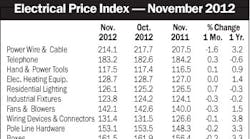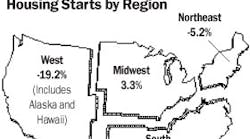Latest from Mag
People - Dec 21, 2012
Obituaries - Dec 21, 2012
November EPI Index Shows No Change
Housing Starts Dip 4% in November
Electrical Marketing - December 21, 2012
Around the Industry - Dec 21, 2012
Plymouth Rubber Co., Canton, Mass., has filed for Chapter 11 bankruptcy protection in Boston because of the inability of its secured lenders and the Pension Benefit Guaranty Corp. to reach agreement regarding the priorities of their respective liens.
“Plymouth has decided to take this step proactively to ensure that it will continue to operate without interruption and maintain full service to our thousands of customers worldwide,” said Maurice Hamilburg, Plymouth’s president. “This action will protect and ensure fair treatment for the company and all interested parties while the dispute is resolved and a satisfactory payment plan negotiated.”
The company also announced that it has arranged, subject to court approval, a cash collateral funding agreement with LaSalle Bank NA, which will immediately provide access to approximately $2 million of funds for continuing operations.
Plymouth Rubber announced in March that it planned to discontinue manufacturing operations at its Canton, Mass., plant, which has 350 employees. The company is closing the plant in favor of lower-cost production from a joint venture it established in China last year, Plymouth Yongle Tape (Shanghai) Co., and other domestic or foreign sources. The joint venture’s new plant near Shanghai has been in production since April, and is expected to reach full production capacity later this year.
According to an article that appeared in the Patriot Ledger, Hamilburg said the company would still maintain about 75 jobs in corporate administration and research and development in the Boston area after the plant closes.
For several months, Plymouth has been negotiating the refinancing of its secured debt, based upon the expected sale of its real estate in Canton. A contract has been signed for the sale and lease-back of the property.

